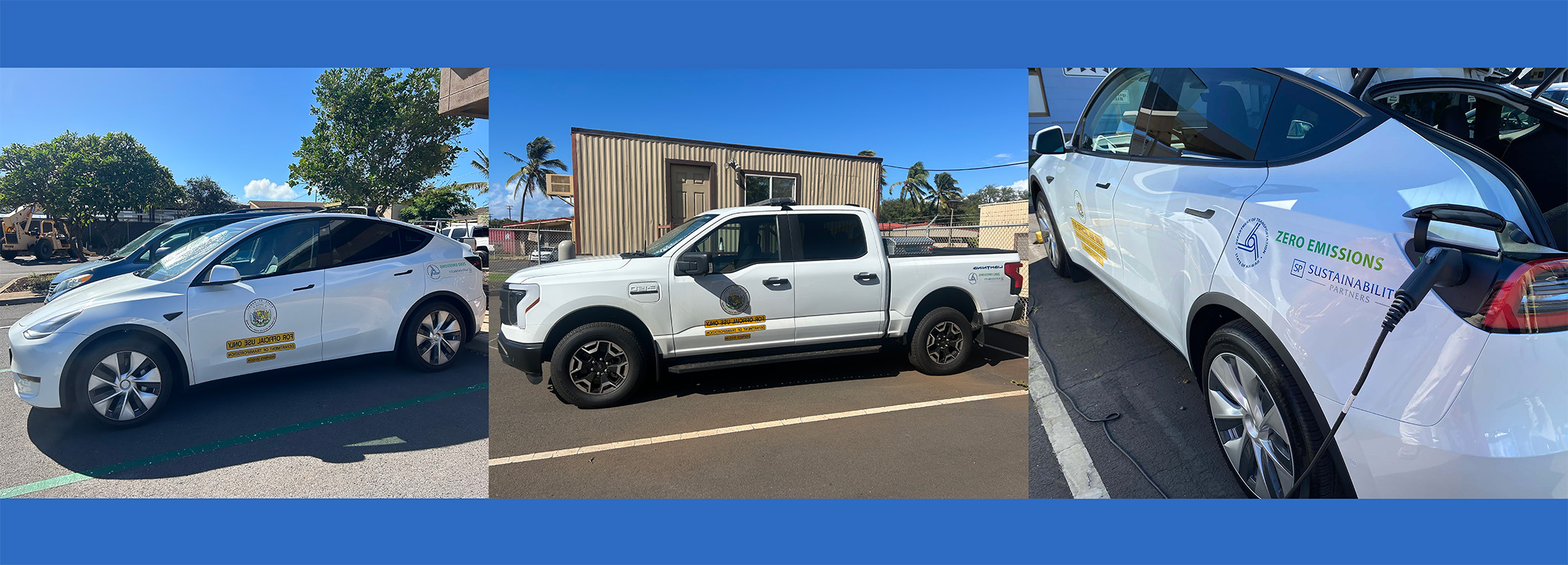
MOTOR VEHICLE PROCUREMENT
– REQUIREMENTS AND EXEMPTIONS –
HRS §103D-412, §196-9 (c)(11), §26-6(b)(12)
MOTOR VEHICLE PROCUREMENT
According to section 103D-412 of the Hawaiʻi Revised Statutes (HRS), starting July 1, 2021, all state government agencies looking to purchase or lease light-, medium-, or heavy-duty motor vehicles shall seek vehicles that reduce dependency on petroleum-based fuels and the priority for selecting such vehicles shall be as follows:
Priority 1 Zero-emission vehicles (ZEVs)
Priority 2 Plug-in hybrid electric vehicles (PHEVs)
Priority 3 Alternative fuel vehicles (AFVs)
Priority 4 Hybrid electric vehicles (HEV)
Priority 5 Internal Combustion Engine Vehicles using fossil fuels (ICEV)
Additionally, vehicles shall not be larger than necessary for their intended functions.
The number of companies manufacturing ZEVs and plug-in hybrids and hybrids is on the rise and the amount of different ZEV and PHEV models available in Hawaiʻi has significantly increased over the past couple of years. The number of available zero-emission and plug-in hybrid SUVs and trucks is also rising. Currently, there are over 40 different models from 18 different automobile manufacturers available for purchase in the state and additional new models keep entering the Hawaiian market. Thus, there is now a wider range of vehicles of various categories to choose from.
The number of EV charging stations has also increased substantially over the past few years. According to the US Department of Energy, there were 368 public EV charging locations/stations in the state as of August 2023, with a total of 853 public charging ports. Oʻahu, Hawaiʻi, Maui, Lānaʻi, Molokai, and Kauaʻi Islands have 506, 100, 139, 7, 1, and 63, currently available charging ports, respectively. The latest number of publicly available chargers is listed and mapped on https://afdc.energy.gov/stations/#/find/nearest.
Hawaiʻi has been allocated approximately $17 million of federal funding through the National Electric Vehicle Infrastructure formula program to build more charging infrastructure and the Hawaiʻi Department of Transportation has a plan to increase the number of public fast charging stations by at least 10 by 2024.
The time required to charge an EV has been decreasing with the installation of Direct Current (DC) fast chargers. These chargers can power an electric vehicle’s battery to 80% in under 20 minutes for most light-duty vehicles.
Furthermore, Act 74 SLH 2021 mandates that agencies manage their fleets to achieve the broader decarbonization goals established under Chapter 225P as well as the clean ground transportation goals outlined in HRS §196-9(c)(10). These goals specify that: a) By December 31, 2030, 100% of light-duty motor vehicles that are passenger cars in the State’s fleet must be zero-emission vehicles; and b) By December 31, 2035, 100% of all light-duty motor vehicles in the State’s fleet must be zero-emission vehicles.
Additionally, HRS §26-6 b)(12), as amended by Act 74 SLH 2021, further defines procurement policies for the State’s fleet:
A) starting from January 1, 2022, all new light-duty motor vehicles that are passenger cars purchased for the State’s fleet are required to be zero-emission vehicles;
B) effective no later than January 1, 2030, all new purchases of light-duty multipurpose passenger vehicles and trucks for the State’s fleet must also be zero-emission vehicles.
To help assist with reaching these goals, exemptions will only be granted under special circumstances.
Two accessible options to procure Priority 1 Zero-Emission Vehicles for state fleets are:
1) Purchase: A state agency may purchase one of the zero-emission cars, SUVs, or light-trucks currently being sold by Hawaiʻi automotive dealerships. A list of most of the ZEVs and PHEVs available for purchase in Hawaiʻi can be found here. This may not be a complete list, as new ZEV and PHEV makes and models continue to enter the market. Many of these vehicles are eligible for federal tax incentives.
2) Procurement as a service: State as well as County agencies may also opt to procure ZEVs as a service via the state’s service contract with Sustainability Partners. The contract can include ZEVs, charging infrastructure, maintenance, and energy on a per-mile cost basis.
*you are not limited to procure vehicles through these two options alone
Where procurement of a zero-emission vehicle would negatively impact the operations of the agency, the agency may request an exemption. The agency must submit the following form (see below) with an explanation and justification of why procuring a zero-emission vehicle or other priority-level vehicle would not be feasible. For example, if an agency is looking to procure an alternative fuel vehicle, it must request an exemption for Priority Level 1 and Priority Level 2 and explain in detail why a zero-emission vehicle (priority 1) and a plug-in hybrid vehicle (priority 2) would not be able to fulfill the agencies needs and how they would impact the agency’s ability to execute its programmatic responsibilities.
The request will be processed by the Hawaiʻi State Energy Office; however, the final decision will be made by the Comptroller of the Department of Accounting and General Services (DAGS), who holds the authority to grant or deny exemptions for new fleet vehicle purchases.
